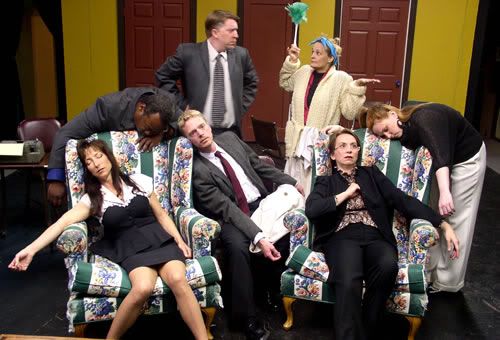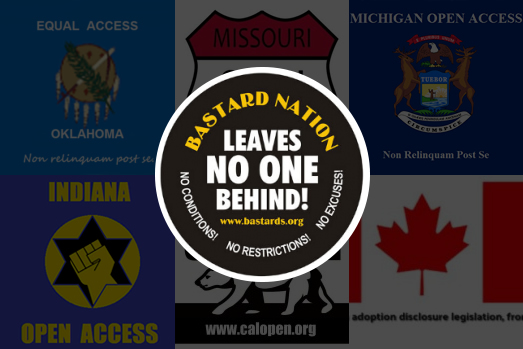
Bad Advice: How To Recognize It, And Dealing With Reunion Realistically
by Maryanne Cohen
Some of the worst advice about dealing with post reunion relationships comes not from NCFA , adoption agencies, or clueless therapists, but from within our own adoption reform movement. Adoption blogs are especially at fault. The reason that their advice is faulty is that it deals in broad generalizations, junk science and unproven assumptions that after a while become what “everybody knows” about adoption reunions, at least everybody in the insular world of adoption reform. There is too much reliance on global statements about “all” adoptees, mothers or adoptive parents, and not enough attention to individual details, which can differ greatly . Going from the particular to the general is often problematic, but it has become the norm on adoption blogs and in groups.
A whole ideology of adoption that cannot be questioned but must be accepted on faith has taken over adoption discourse. Some of this can be helpful , if your reunion was equally welcomed by both parties and falls within the narrow parameters of what is considered typical, but can be disastrous and wrong for someone dealing with an atypical reunion, which I suspect are more numerous than some would have us believe.
The human mind loves to see patterns, and imposes them on chaos even where no real pattern exists. In adoption, it is easy to see what one wants to see, which in many cases is that adoption is in and of itself dysfunctional and evil, and that all adoptees are in some way wounded or flawed because of their adoption experience. Those who are in pain because of adoption, and that is many of us, tend to see that pain everywhere, and to go with the confirmation bias of believing whatever reinforces our pre-conceived notions, and ignoring that which does not.
This way of thinking starts from a grain of truth, that sealed record secret adoption IS dysfunctional and creates difficult problems for many adoptees, but moves on to generalize and pathologize all adoptees, all adoption, all reunions. We are told that all adoptees are angry, or should be, that all adoptees are primally wounded from birth onward, that all adoptees need connection with their biological families, that adoption trauma is forever, that all decent surrendering mothers were coerced. We are told that adoptees who do not have deep curiousity or a need to reunite are in denial, in the fog, “drank the KoolAide”, and are only trying to please their adoptive parents. We are told that reunions are vital but do nothing to assuage grief and loss, and usually make it worse. While these things are true for some, they are not true for all, and most often are not true for those who do not join adoption support groups, but that gets lost. Anyone questioning these beliefs is accused of disloyalty, denial, or of promoting adoption.
Many of us went into reunion with lots of expectations and stereotypes of what adoptees think and feel. We got these notions from our own support groups full of searching adoptees, from reading adoptee blogs and lists or adoptee memoirs and advice books. A problem arises when the adoptee you find was not searching, was not waiting to be found, does not see being an adoptee as a major issue or the core of their life and identity. There may be many adoptees like this out there, but we do not hear from them because they have no desire to join adoption reform or support groups, nor to write about adoption. It just is not that big a deal to them. People differ greatly in how they deal with and react to adverse life circumstances. Coping mechanisms and what is important in life vary a lot from person to person; it is not wise to assume anything about someone you do not know. And you do not know your surrendered child yet. At reunion they are a familiar stranger, not a clone. Even though they may be a lot like you in many ways, that is one more thing you cannot assume or count on. There is no special intuition that enables you to read their minds, no matter how much you love them.
Mothers in triad support groups often come to see adoptees in the group as being what they wish their son or daughter were, and adoptees see some mothers from the group as their ideal mother. This dynamic is almost inevitable, and is OK if not taken literally. It can be a source of friendship, comfort, and support, but it can also be a source of very bad advice and assumptions about dealing with the kind of adoptee never found in these groups. Your adoptee friends are just that, friends. They are not your child and do not know what your child is thinking or feeling, and may be very different from the person you find. Fantasy is fun, but in reunion being grounded in your individual reality it vital.
Everyone in reunion has to meet their child or their parent where they are, not where we think they should be or wish they would be, and not where we have been told they are by others with a different outlook and philosophy. This means discarding everything you have been told about how all adoptees feel, and really listening and reacting only to what YOUR adoptee feels and expresses to you. Respect for boundaries is vital. If you are told by your child they want no contact, or limited contact, you must honor that, no matter how hard it may be. “No means no” in reunion as well as in dating situations! Anything that can be construed as stalking, no matter how well-intended, is out. If you have a public blog or Facebook page, assume that your adoptee reads it, and do not say anything about them you would not want them to read, or anything that can be taken as a passive/aggressive challenge.
Do not listen to those who tell you that your son or daughter is just testing you by saying “no contact”, and really wants that birthday card, phone call, or email despite what they have explicitly said. Of course if you have never been told not to contact your child, but are met by silence, not rejection, that is another matter and much more ambiguous as far as how to proceed. Just keep in mind that nobody knows how your son or daughter feels but themselves, and nobody can give you a formula to make them respond. Follow your heart, but also follow empathy, courtesy, and common sense. Do not do anything on impulse that you may regret later if the consequences are not what you wanted.
Some rejections will never turn around and there is a time to stop trying and obsessing and to get on with living the rest of your life. Patience is key, and it may take many years to gain your adoptee’s trust. Some reunions do turn around after many years of silence. But for those that do not, or where there is overt hostility, at some point for everyone’s sake, you may have to just let go. Not every reunion works out or was made in heaven, and some mothers find adoptees who are abusive; in which case the mother may have to step back. Nobody should have to take endless abuse from any family member. Many reunions fail because of unrealistic expectations on either side, but some are just impossible due to mental illness or substance abuse or other factors beyond anyone’s control. It is possible to still love your child but not be able to safely deal with them.
Some family members find that they just do not like each other and have little in common beyond biology. Some people wish they had never searched, and should be allowed to express this, just as those whose reunions are a pure source of joy should be allowed to express that, as well as those whose reunions are rocky and difficult but ongoing. Nobody’s own story and feelings are a criticism of anyone else’s story or feelings, a fact often forgotten in adoption discourse where everything is taken personally. Nobody should be censored or made to feel irrelevant because their story is different. My feelings and beliefs about my reunion are not a criticism of yours, and yours are not a criticism of mine, but we all need to listen to and respect each other’s differences as well as similarities.
If your adult child is reluctant to be in touch with you, it might be because of loyalty to the adoptive parents, but it may not be, and that certainly is not always the case. Many other factors can play into this. Again, don’t assume, but deal with what you actually know and can see. If it is an issue of loyalty, refuse to participate in a tug-of-war with your child in the middle. Don’t make them choose, or in most cases you will be the one to lose. Be the patient and kind mother, not the grasping demanding one, and things may go your way eventually. Remember that your adoptee has two families and that is a hard place to be. Don’t add to the drama and stress, but be an understanding resource and haven for your child.
You can express sorrow for the past, but don’t keep going back there, and do not assume you child wants to go back there either. You are meeting a fully-formed adult with a life of her own. Tell your story honestly, answer all questions, then move on. Regression is unhealthy and will not facilitate a good reunion relationship. No, you can never get your baby or the lost years back, but all that was gone long ago. Live for today rather than vainly trying to recreate yesterday . Apologize sincerely once, but do not let guilt and sorrow be the whole basis of your relationship.
It is also important to avoid attitudes of entitlement, anger and resentment. The past cannot be changed, but the present and future can be made better. Let go of the idea held by many in adoption reform that as a surrendering mother you can NEVER get over losing your baby, and that even the best reunion makes little dent in the perpetual grief. That is just not true for everyone, and you do not owe it to anyone to stay in a miserable place just to fit in to the accepted norm in any group. More pain does not equate with more love. There is way too much “misery loves company” in adoption reform, and too many people are trapped ruminating over things from the past that cannot be changed, but can be overcome, and are kept in that loop by their supposed friends in reform. Sometimes we are our own worst enemies.
May 31 2012




